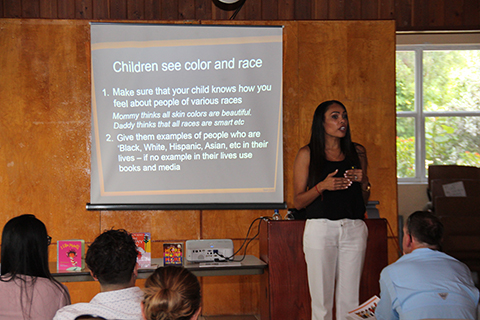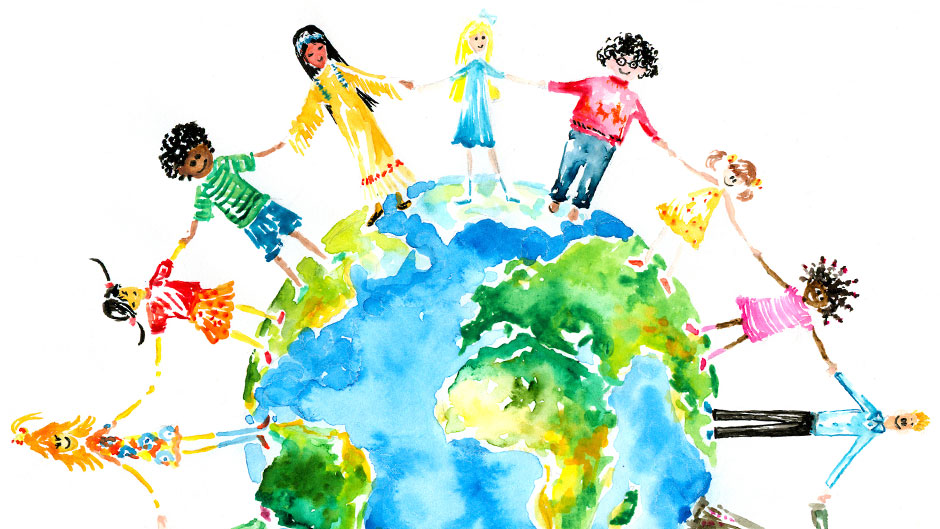As a little black girl growing up in Ohio, Monica Page, Ph.D. ’10, remembers feeling the sting of things she was told—sometimes purposefully—about her race and gender. Page, a practicum coordinator and program manager in the School of Education and Human Development’s Department of Educational and Psychological Studies (EPS), believes it’s her responsibility as a counselor to spare children today from hearing some of those same painful messages about their racial identity.
Page, also a licensed psychologist, offered the first of a series of free community parenting workshops, “How to Talk with Your Kids About Race,” on May 23 at the Child Care Center at Riviera Presbyterian Church. Her own two young daughters attend the center.
“Parents are well-intentioned, but I’ve heard some things in personal conversations and have read some parenting statements [about race and identity] that were untrue,” she said. “I felt compelled—and was specifically trained—to address some of these. As counseling psychologists, our goal is not just working with clients in a session but also advocating for these ideals and theories that we believe in the field. We have a responsibility to actually make them known and happen in our communities.”
Page admits that she’s tackling a monster of a topic. “I want to give parents some solid takeaways. My goals are to provide some specific things to say, read, watch on television—and anything beyond that is good,” she said. “I’m clearly just scratching the surface.”
At the session Wednesday her number one goal was colorfully clear.
“It’s our job as parents to explore and see what our children are thinking about. We need to initiate the conversation,” she said, adding that “yet we don’t need to have all the answers to their questions.”

Much of what Page seeks to share in the seminars is an outgrowth of her graduate studies in counseling psychology and her current position with EPS. “In the school we have a laser focus talking about issues of race, gender, and sexual identity,” she said. “In terms of our research, training students and working with community partners—we’re talking about race every day.”
Yet her skin in the game cuts much deeper.
“I have very clear memories of being 4 or 5, one of two black kids in kindergarten, and just not being supported in terms of being racially or culturally different. I’m Just trying to combat those things from various angles. This [offering the session] is something that’s been brewing in me for a long time—something I need to do. For now, it’s my civic duty.”
Early career experience as a kindergartner teacher also taught Page a lot about the spectrum of racial identity in the schools and education.
At one urban Columbus, Ohio school, Page’s classroom was a mix of one third black American students, one third black Somalians, and one third Hispanic children. She remembers a mother who, on the first day of class, informed Page that her light-skinned daughter was biracial and identified as “black.”
That information proved valuable when in the midst of a kids’ conversation about color, one dark-skinned boy told the little girl that “no, you’re not black.” Stunned by the assertion, the little girl looked to her teacher: “Ms. Hobbs, I am black, aren’t I?” “Yes, you are, my dear,” was the quick reply.
Page suggests that parents should help their child’s teachers know how they want to identify in terms of race, ethnicity and other distinctions.
In addition to her work with EPS, Page’s post-doctoral research continues her focus on cultural and racial aspects of how we function in the world and on the development of children’s racial identity.
She plans to offer upcoming parent educational sessions on gender and sexuality.
“Some parents really struggle with having these conversations with their kids, but we need to get comfortable with the uncomfortable,” she said. “I want to give them some tools and for them to see me as a resource. Our positive overall racial identity is linked to our well-being, and it’s about getting to the place where we feel good about the groups we represent.”
It’s most important to make sure that children know what you believe as a parent and what you expect them to believe. And that means that parents should grapple with their own biases and do all they can to dispel their own prejudices. Page urged parents to start early, reading books and sharing pictures with their children that demonstrate that “beauty,” “smarts,” and even financial well-being come in a wide palette of colors. She showed videos of research findings that indicate that even at the youngest ages we exhibit tribal—us and them—tendencies.
Suggestions for Talking with Your Children about Race:
- Be proactive—initiate conversations about race and culture.
- When you see an incident that may be race/culture related—address it.
- Provide teachers an update as to where you are in the “racial identity talks”
- When incidents present themselves that are racially charged—discuss them.
- Be aware of how others are being treated and intervene.
- Buy books and movies that reflect positive strong images of many cultures.
- Actively engage in learning about other cultures.
For more information, contact Page at drmonicapage@gmail.com.

